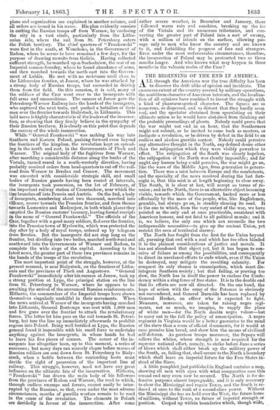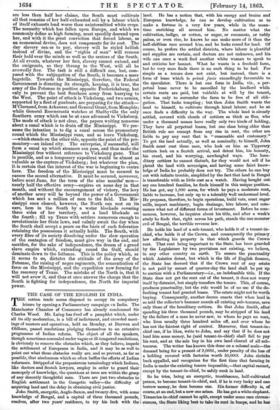THE BEGINNING OF THE END IN AMERICA.
A LL through the American war the true diffiulty has been to discover the drift alike of opinion and incidents. The enormous extent of the country covered by military operations, the multiform character of American interests, and the localiza- tion of all opinions have combined to invest the struggle with a kind of phantasmagorical character. The figures are so numerous, so dispersed, and so distant that they hardly seem real, and the spectator abstained from speculating on their ultimate action as he would have abstained from thinking out the probable proceedings of ghosts. Nobody could prove that the war might not end in an hour, that the Southerners might not submit, or be invited to come back as masters, or instigate a revolution, or be driven by defeat in the field to an endless and aimless guerilla contest. Nobody could perceive any alternative thought in the North, any defined desire other than the subjugation which they were visibly powerless to effect. The subjugation of the South was clearly hopeless, the subjugation of the North was clearly impossible; and for aught any human being could perceive, the war might go on, like the wars of the Middle Ages, from generation to genera- tion. There was a mist between Europe and the combatants, and the specialty of the news received during the last fort- night is, that this mist is at length beginning to clear away. The South, it is clear at last, will accept no terms of re- union; and in the North, there is an alternative object becoming visible, towards which the Government, backed more or less effectually by the mass of the people, who, like Englishmen, grumble, but always go on, is steadily clearing its road. It is the one to which, from the very outset of the war, we have pointed as the only end at once practicable, consistent with American honour, and not fatal to all political morals ; and it is, we believe, the only one which can reconcile the two indispensable necessities—to give up the ancient Union, yet restrict the area of territorial slavery.
The North has fought from the first for the Union beyond all, pursuing that end with a zeal which has too often blinded it to the plainest considerations of justice and morals. It has not abandoned that object yet, but it has begun to con- ceive of failure as among the possibilities, and consequently to direct its unrelaxed efforts to ends which, even if the Union be destroyed, may mitigate the resulting calamity. For conquest its only chance is emancipation, which must dis- integrate Southern society ; but that failing, or proving too slow, the North has in itself the power to enclose the Confe- deracy within a ring fence of free states. It is to the double end that its efforts are now all directed. On the one hand, the hope of action with the army of the Potomac is obviously not surrendered, and General Burnside has been replaced by General Hooker, an officer who is expected to fight. Measures, moreover, are taken for raising negro regi- ments, not so much, we imagine, to supply the place of white men—for the North doubts negro valour—but to carry out to the full the policy of emancipation. A negro regiment in Virginia would be a better guarantee to the mind of the slave than a ream of official documents, for it would at once promise him bread, and show him the means of civilized self-defence. As garrison troops moreover, the Sepoys will relieve the whites, whose strength is now required for the supreme national effort, namely, to strike before June a series of blows which shall either break up the military power of the South, or, failing that, shall secure to the North a boundary which shall leave an imperial future for the Free States in- stead of the Slave.
A little pamphlet just published in England contains a map, showing all men with eyes with what comparative case this second end may even now be secured. The North is for de- fensive purposes almost impregnable, and it is only necessary to clear the Mississippi and regain Texas, and the South is re- duced at once to the rank of a second-class power. Without the Mississippi she has no hold over the West, the future home of millions, without Texas, no future of imperial strength. or position. Cooped up within boundaries which, though wide, are less than half her claims, the South must cultivate all that remains of her half-exhausted soil by a labour which of itself exhausts land worse than unintennitted white crops. The necessity which has fallen upon Europe, and which we commonly define as high farming, must speedily descend upon her, and with it the great conviction that forced labour, as an economical device, does not compensate for its cost. The day slavery cea: es to pay, slavery will be styled hellish instead of divine, and the "rights of man" will resume their hold over the minds as well as the orators of the South. At all events, whatever her fate, slavery cannot extend, and the emigrants, as they throng to the West, will all be avowedly free. The task is still a difficult one, but, com- pared with the subjugation of the South, it becomes a mere bagatelle. Towards the Mississippi, therefore, the Federal Government is directing its strength, keeping, it is true, the army of the Potomac in position opposite Fredericksburg, but only to prevent the best Southern army from hurrying to the West. The point of attack is Vicksburg, and two armies, supported by a fleet of gunboats, are preparing for the attack- M'Clernand, from Arkansas; and General Grant, from Memphis; while General Rosencrantz watches at Shelbyville the only Southern army which can be at once advanced to Vicksburg. The mode of attack is not clear, the papers writing nonsense about a canal which is to drain off the Mississippi. We pre- sume the intention is to dig a canal across the promontory round which the Mississippi runs, and so leave Vicksburg, —which stands on the other side, opposite the point of the pro- montory—an inland city. The enterprise, if successful, will form a canal up which steamers can pass, and thus make the *Mississippi free without reference to Vicksburg guns. That is possible, and as a temporary expedient would be almost as valuable as the capture of 'Vicksburg; but whatever the plan, it.is certain that the interest of the war is beginning to centre here. The freedom of the Mississippi must be secured to ensure the second alternative. It must be secured, moreover, before next dune, for the term of the nine months' men— nearly half the effective army—expires on some day in that month, and -without the encouragement of victory, the levy of another army will be beyond the power of a Government which has sent a million of men to the field. The Mis- sissippi once cleared, however, the North can rest on its oars, hem in the South by a water blockade covering three sides of her territory, and a land blockade on the fourth ; fill up Texas with settlers numerous enough to revolutionize her State laws, and calmly await the day when the South shall accept a peace on the basis of each federation retaining the possessions it actually holds. The South, with every fibre of its society dissolving under the slow operation of the contagion of freedom, must give way in the end, and sacrifice, for the sake of independence, the dream of a grand slave empire which, extending round the Gulf, should dominate down to the Isthmus. This is the policy which, as it seems to us, dictates the attitude of the army of the Potomac, the raising of negro regiments, the concentration of force on the Mississippi, and the expedition now forming for the recovery of Texas. The mistake of the North is, that it will not avow it, and thus at once answer the charge that the South is fighting for independence, the North for imperial
power.































 Previous page
Previous page